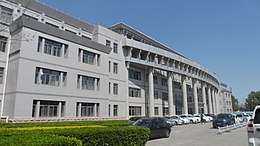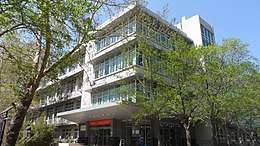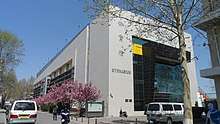University of International Relations
University of International Relations (UIR; simplified Chinese: 国际关系学院; traditional Chinese: 國際關係學院; pinyin: Guojì Gūanxì Xúeyuàn) is a public university, in Beijing, China. It offers undergraduate and graduate programs in International Politics, International Economics and trade, Law, English, French, Japanese and Public Administration. It currently offers a total of 13 undergraduate programs, and eight master's degree programs.[1]
国际关系学院 | |
 | |
Former names | Institute of International Relations |
|---|---|
| Type | National |
| Established | 1949 |
Officer in charge | Lin Xiaoke |
| Chairman | Prof. Liu Hui |
| Vice-president | Prof. Guo Huimin |
| Location | , |
| Nickname | 国关 Guó Gūan |
| Website | University of International Relations (in Chinese) |
UIR was established in 1949 by China's first Premier of the People's Republic of China Zhou Enlai to train diplomats. It became one of the National Key Universities in 1960, and was among the earliest universities in China to offer master's degrees. In 1983, the school was transformed to a comprehensive university. It was the first foreign study schools in China to make such a transformation.[2][3]
Its former English name is translated as "Institute of International Relations." It is also colloquially known as "Guoguan" (国关 Guó Gūan).
History

The University of International Relations was founded in 1949 to train foreign affairs cadres for the newly created People's Republic of China. In 1961, the school merged with the Foreign Affairs College.[4]
In 1964, then-Premier Zhou Enlai ordered the creation of colleges and university departments to focus on international affairs.[5] Several government agencies, including the Ministry of Foreign Affairs and the International Liaison Department of the Communist Party of China, established their own institutes for the study of international affairs. The University of International Relations in Beijing was formally brought under the control of the Ministry of Public Security in 1965, and was charged with training intelligence agents for the Investigation Department (a precursor to the Ministry of State Security) and for Xinhua News Agency.[4][5]
Like many schools in China, the University of International Relations was shuttered during China's Cultural Revolution and reopened in 1978.[6] It was among the first institutions of higher education authorized by the Chinese government to offer academic degrees in China.[7]

According to the Australian Strategic Policy Institute and other sources, the university remains closely linked to the Ministry of State Security.[8][9]
Academics
Undergraduate
|
|
Graduate
|
|
Partnerships
The university maintains partnerships and exchanges with Marietta College, University of Massachusetts Boston, Aalborg University, Toulouse 1 University Capitole, Hiroshima University, Hiroshima City University, Ibaraki University, among others.[8]
Controversy
The university's role within the bureaucracy of the People's Republic of China is subject to some debate: Chinese government sources and the university's website maintain that it operates under the Ministry of Education,[10][11] but other sources contend that the university is affiliated with Chinese intelligence agencies along with Jiangnan Social University, namely through the Ministry of State Security.[8][5][4][9]
Notable alumni

- Liu Huan, Artist, Singer of the 2008 Beijing Olympics theme song
- Yan Xuetong, Director of the Institute of International Studies, Tsinghua University
- Ma Jun, Chinese Environmentalist, Non-Fiction Writer, Environmental Consultant, and Journalist
- Qin Gang, Vice Minister of Ministry of Foreign Affairs, the People's Republic of China
- An Min, Former Vice President of Department of Commerce, the People's Republic of China
- Mei Feng, Screenwriter, Prix du scénario (Best Screenplay Award) winner of 2009 Cannes Film Festival
- Du Wei, Diplomat, former Chinese Ambassador to Israel
References
- University of International Relations, Academic disciplines Archived October 13, 2012, at the Wayback Machine, Accessed 07-20-2012.
- "History of University of International Relations". University of International Relations. Archived from the original on January 20, 2019. Retrieved January 19, 2019.
- "中共中央关于增加全国重点高等学校的决定". 新华网. Archived from the original on January 19, 2019. Retrieved January 19, 2019.
- Chan, Gerald (1998). International Studies in China: An Annotated Bibliography. Nova Publishers. ISBN 978-1-56072-588-6. OCLC 923873469.
- Shambaugh, David (2002). "China's International Relations Think Tanks: Evolving Structure and Process". The China Quarterly. 171 (171): 575–596. doi:10.1017/S0009443902000360. ISSN 0305-7410. JSTOR 4618770.
- Barnett, A. Doak (July 11, 2019). The Making Of Foreign Policy In China: Structure And Process. Routledge. ISBN 978-1-000-30316-2. OCLC 1108547701.
- "University of International Relations". Archived from the original on July 10, 2011. Retrieved July 10, 2011.
- "University of International Relations". Australian Strategic Policy Institute. Archived from the original on November 27, 2019. Retrieved November 27, 2019.
- Wise, David (June 14, 2011). Tiger Trap: America's Secret Spy War with China. HMH. p. 8. ISBN 978-0-547-55487-7. OCLC 759835935.
- Introduction, University of International Relations
- List of National Key Universities in China, China Education Net
External links
| Library resources about University of International Relations |
- University of International Relations (in Chinese)